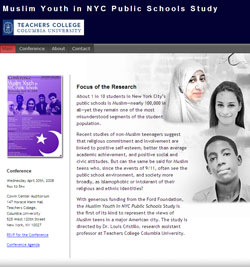Post 9/11: NYC Muslim Public School Students Feel Safe, But Hyper-Aware of Religious Identity
The results of the study -- Muslim Youth in New York City Public Schools: Religiosity, Education and Civic Belonging –were presented and discussed on April 30th at an all-day conference at Teachers College.
About one in 10 students in
Yet the post-9/11 environment has heightened the value of Islam as a marker of identification for Muslim students.
“These kids are hyper-conscious of being Muslim whether they are religious or not,” says Louis Cristillo, the Teachers College faculty member who led the three-year study. “It’s as if they’re another racial group – ‘the Muslims.’ They themselves will say ‘the Muslims’ and ‘the Americans’ and ‘the white folks.’ But that hyper consciousness has not been imposed upon them in their schools. It’s generated by the constant news coverage of their religion, typically framed by very negative coverage. If you’re a Muslim, you’re in the news every single day, and it’s been like that since 9/11.”
Among the study’s other key findings:
- Eight in ten Muslim public school students surveyed in the study think their schools are “pretty cool” and 85 percent say they feel safe. When asked in focus groups to say if they would switch to any other school if given the chance, virtually all the students said they like would stay where they are.
- Yet the school environment isn’t wholly welcoming. Seventeen percent of Muslim public school students, most of whom are of either African American, Arab or South Asian ancestry, report having been the object of bigotry, often in the shape of teasing or offensive taunting about Islam or being a “terrorist.” Arab students are twice as likely to be targeted, and girls more often than boys.
- Most Muslim students feel pretty comfortable with their Muslim identities and harbor few serious doubts about their religious convictions. Only 12 percent of those in public schools and 9 percent of those in private schools were prone to doubting the tenets of Islam, compared to 30 percent of non-Muslims who expressed doubts in their faith traditions. Muslim students were about half as likely as Christian students to admit some doubts.
- Yet nearly one in three Muslim public school students say that 9/11 made them feel uncomfortable about their Muslim identity. And while 43 percent feel that Americans in general are respectful and tolerant towards them, 69 percent thinks that mainstream society is suspicious of them, and nearly all feel that discrimination against Muslim Americans has increased since 9/11. Nearly two-thirds believe that a Muslim wearing Islamic attire would face discrimination in the workplace.
- Twenty-eight percent of Muslim students report being stopped by a law enforcement officer as a result of racial profiling; 12 percent report being turned down for a job; 11 percent report suffering the destruction of property; and 7 percent said they have been physically assaulted.
- Only 9 percent of Muslim students report having tried to pass as someone of a different ethnic or racial group, but 29 percent have at some point used a non-Muslim sounding name.
At the close of the conference, responding to an audience member who was worried about the need to better “Americanize” Muslim students, Cristillo said, “If you walk away with anything from this conference, it should be that we don’t need to ask how we can better educate Muslim students, but instead, how did the voices in this study educate you?”
Published Wednesday, Apr. 30, 2008
